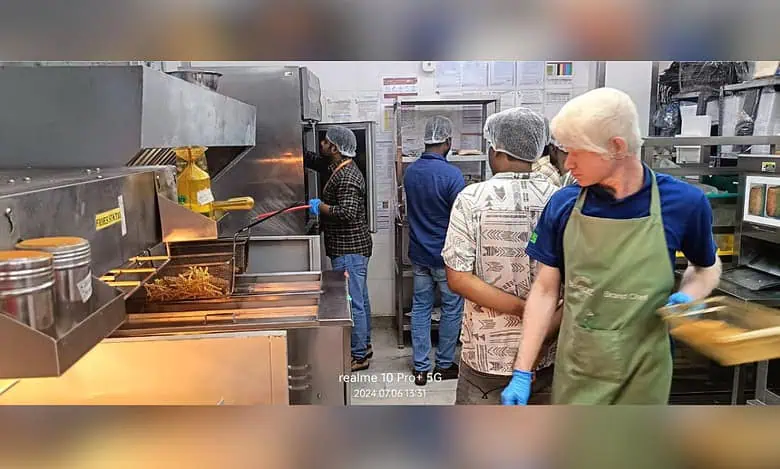
Food Safety Raids in Ameerpet
Conducted on Cloud Kitchens in Hyderabad’s Ameerpet
Hyderabad: On Saturday, July 6, officials from the Food Safety Department of Telangana conducted raids on several cloud kitchens in Hyderabad’s Ameerpet, uncovering numerous hygiene and sanitary violations.
Expired Products and Improper Labelling Found
At “Rebel Foods Private Limited,” a cloud kitchen located in SR Nagar, Ameerpet, inspectors discovered expired products including Peri Peri Sprinkler Seasoning (1 kg), Frozen Baby Potato (1 kg), Green Cabbage (2 kg), and 100 sachets of Garlic Bread Seasoning. Additionally, the facility was not displaying the true copy of the FSSAI license, a mandatory requirement. The Food Business Operator (FBO) was found operating the kitchen under 27 different brand names, claiming it as a multi-brand kitchen. Several food items in the refrigerator were improperly labelled.
However, the food handlers at Rebel Foods were compliant with some regulations, wearing hairnets, gloves, and uniforms. The premises had pest control records, Medical Fitness Certificates for food handlers, and water analysis reports for the RO water used in food preparation. A Food Safety Training and Certification (FoSTaC) trained supervisor was present.
Compliance at ITC Limited
At another cloud kitchen operated by ITC Limited in SR Nagar, Ameerpet, officials found no hygiene or sanitary violations. The FBO was running the kitchen under the names ITC MasterChef, Sunfeast Baked Creations, and Aashirwad Soul Creations. The true copy of the FSSAI license was displayed on-site, and food handlers adhered to safety protocols, wearing hairnets, gloves, and uniforms. All food items were properly labelled and stored in covered steel containers. The facility also maintained pest control records, Medical Fitness Certificates, and a water analysis report for the RO water used. A FoSTaC trained supervisor was available at the premises.
Additional Raids and Findings
On July 6, the Food Safety Department also conducted raids on several restaurants in Hanumakonda, Medak, and Suryapet, where they found severe hygiene and sanitary violations that posed significant health risks to consumers.
Precautions for Maintaining Hygiene in a Cloud Kitchen
- Regular Cleaning and Sanitization:
- Clean and sanitize all surfaces, equipment, and utensils regularly.
- Use approved disinfectants and ensure thorough cleaning of high-touch areas.
- Proper Food Storage:
- Store raw and cooked foods separately to avoid cross-contamination.
- Use airtight containers and label them with dates to ensure proper rotation.
- Temperature Control:
- Maintain appropriate temperatures for storing perishable items.
- Regularly monitor and record temperatures of refrigerators and freezers.
- Personal Hygiene of Staff:
- Ensure staff wear clean uniforms, hairnets, gloves, and masks.
- Implement strict handwashing protocols and provide hand sanitizers at multiple points.
- Pest Control:
- Implement a robust pest control program with regular inspections.
- Seal any cracks or openings and maintain cleanliness to deter pests.
- Waste Management:
- Dispose of waste promptly and hygienically.
- Use covered bins and ensure regular waste removal to prevent contamination.
- Water Quality:
- Use clean, potable water for cooking and cleaning.
- Regularly test and maintain water purification systems like RO units.
- Health Monitoring of Staff:
- Conduct regular health checks and maintain Medical Fitness Certificates for all food handlers.
- Ensure sick employees do not handle food and have a clear policy for reporting illnesses.
- Training and Certification:
- Provide regular training on food safety and hygiene practices.
- Ensure at least one supervisor is trained and certified in Food Safety Training and Certification (FoSTaC).
- Proper Labelling and Documentation:
- Label all food items with preparation and expiry dates.
- Maintain records of cleaning schedules, temperature logs, pest control measures, and health certificates.
- Compliance with Regulations:
- Display the FSSAI license and other necessary certifications.
- Stay updated with local food safety regulations and ensure compliance.
- Cross-Contamination Prevention:
- Use separate cutting boards and utensils for raw and cooked foods.
- Implement color-coded equipment to easily identify specific uses.
- Ventilation:
- Ensure proper ventilation in the kitchen to avoid smoke, odors, and excess heat.
- Regularly clean and maintain exhaust fans and ducts.
- Ingredient Quality Control:
- Source ingredients from reputable suppliers.
- Inspect deliveries for quality and hygiene before accepting them.
- Allergen Management:
- Clearly label all allergens in food items.
- Train staff on handling and preventing cross-contact with allergens.
- Packaging Hygiene:
- Use food-grade packaging materials.
- Ensure packaging areas are clean and sanitized.
- Staff Hygiene Education:
- Educate staff on personal hygiene practices such as keeping nails trimmed and avoiding jewelry.
- Provide facilities for staff to change into uniforms and wash hands before starting work.
- Equipment Maintenance:
- Regularly inspect and maintain kitchen equipment to ensure it is functioning properly.
- Calibrate thermometers and other measuring devices periodically.
- Customer Feedback:
- Encourage customer feedback on food quality and hygiene.
- Address any concerns promptly and use feedback to improve hygiene practices.
- Emergency Procedures:
- Have a plan in place for handling foodborne illness outbreaks or other emergencies.
- Train staff on emergency procedures and ensure they know how to respond effectively.
- Supply Chain Audits:
- Conduct regular audits of suppliers to ensure they adhere to hygiene standards.
- Maintain traceability of all ingredients from suppliers to the final product.
- Handwashing Stations:
- Install sufficient handwashing stations with soap and paper towels.
- Ensure these stations are easily accessible to all staff members.
- Sanitizing Utensils and Equipment:
- Use commercial dishwashers or proper sanitizing methods for utensils and equipment.
- Ensure utensils and equipment are completely dry before use.
- Clear Operational Procedures:
- Develop and document standard operating procedures (SOPs) for all kitchen operations.
- Regularly review and update SOPs to align with best practices and regulatory changes


